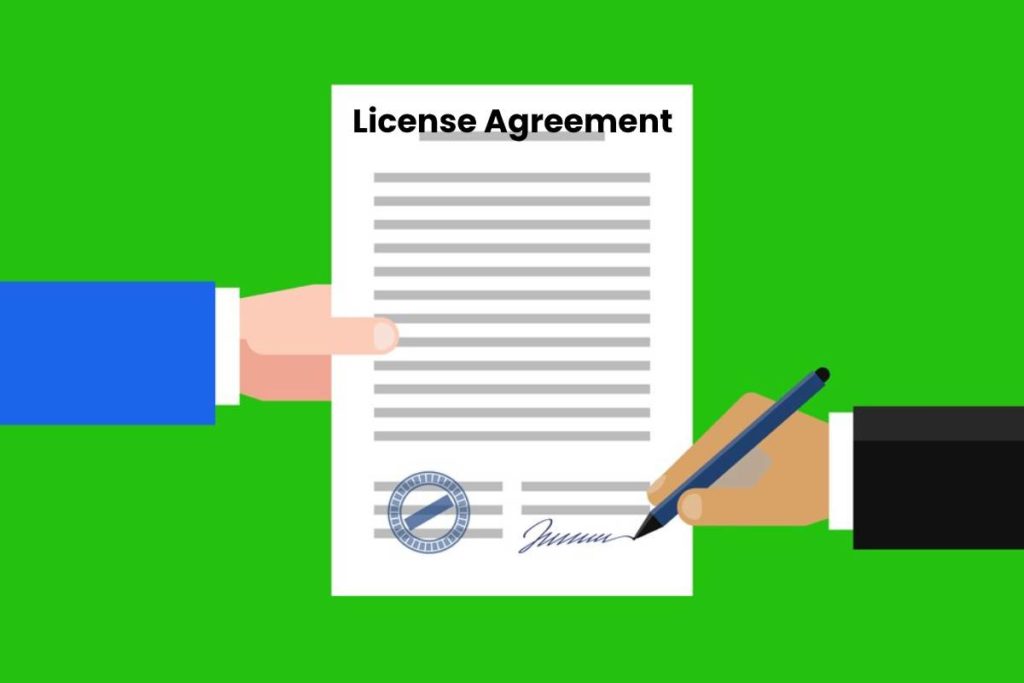Table of Contents
License Agreement Definition
A license agreement is a contract between two parties (the licensor and the licensee). The licensor scholarships license the right to use the brand, trademark, patented technology, or the ability to crop and sell goods owned by the licensor.
In other words, an end-user license agreement gives the licensee the ability to use the intellectual property owned by the licensor. And also, the licensor often uses licensing agreements to commercialize their intellectual property.
In a typical license agreement, the licensor agrees to provide the licensee with intellectual property rights, such as the licensor’s technology, brand name, or product creation knowledge.
What are the Characteristics of the License Agreement?

As characteristics of the license agreement, we can highlight the following:
1. Promising Contract
- This contract results purely in one of the parties’ commitments and legal obligations, such as a contract.
- One of the parties is committed to building a particular house according to a plan. And also, in return, the other party is bound to pay you.
- It differs from the possessory contract, a contract that transfers property from one party to another.
- The seller is obliged to deliver the property to the buyer. In possessory contracts, the negotiated case must be available during the contract. Otherwise, the transaction is void.
- But in the promissory contract, the transaction may not be available during the contract and be created later.
- Considering the nature of the license agreement ( intellectual property ) and no external objectives, we put it in the category of promising contracts.
- However, the transfer of ownership of the patent or trademark (and other industrial properties) may result in the license agreements’ ownership characteristics.
- In this case, the assignee has the right to pursue directly without resorting to transmitting any person who has violated or exploited the patent or registered trademark.
2. Bilateral
- The contracts have been divided into bilateral or unilateral depending on whether two parties participate or only one.
- There are reciprocal obligations for both parties in bilateral contracts, while in unilateral agreements, there is only a commitment for one of the parties.
- In the case of reciprocal licenses, there is no doubt that the contracts mentioned are bilateral.
- The giver of the license agrees to assign intellectual property of the subject of the contract, and the recipient of the license agrees to pay royalties.
- A distinction must make between registered and unregistered intellectual property licenses.
- The registered intellectual property license, in the register of trademarks and patents, indicates different conditions.
- And also, failure to use the property within the expiration date of the law grants the right of nullity to each beneficiary.
- Regarding intellectual property, including technical knowledge, which is not registered, the licensee obtains the obligation to exploit, unless otherwise indicated in the contract.
- Non-use of the property does not oblige them to seek invalidation or compulsory license.
3. Formal
- The intention contracts are contracts that conclude according to the parties’ will, provided that there is some benefit.
- The implementation of these contracts does not require any formalities, such as the use of specific terms.
- A formal contract is an agreement with certain formalities, such as formalizing official documents, and the parties’ will is not enough; it will express in a certain way.
- Is the license agreement a permit agreement or a formal one?
- In answer to this question, some distinctions must make between registered and unregistered intellectual properties. In the first case, the contract is formal, and in the second case, the deal is a permit.
- Some articles of registered patents have also required any transaction related to a patent or trademark record. If they are not registered, they are not valid for third parties.
What are the Types of License Agreement?

Different types of licenses depending on the product covered by them, their exclusivity or not, and their duration. Let’s look at each of them.
1. Patent
- Patents cover science and innovation. Patent licensing agreements are the documents did which a patent owner lets someone else use their patent.
- In practice, patent owners select to license their patents to manufacture and widely distributed.
- The people and companies that create patentable material (such as new inventions) are often not the same parties that can easily make and distribute it.
- It’s easier to let someone else handle the patent’s business side while continuing to earn royalty payments.
- These are usually the most compound types of license agreements due to all that goes into obtaining and maintaining a patent.
2. Trademarks
- Trademarks are signifiers of commercial origin, namely brand names and logos or slogans.
- And also, trademark license agreements allow trademark owners to allow others to use their intellectual property.
- Most of the time, trademark owners license their trademark for commercial products, such as clothing, iPhone cases, or food products.
3. Copyright
- Copyright is the art of the world of intellectual property. Copyrights exist, for example, in works of visual art, such as paintings, movies, or songs. These rights also exist in characters, such as Mickey Mouse.
- Copyright license agreements are often used for consumer goods, as are trademark licenses. They also use for distributions, such as with musical works or movies.
4. Trade Secrets
- Trade secrets are unique in that they do not register with the government.
- Patents, trademarks, and copyrights are most valued when they register.
- And also, trade secrets protect only through their secrecy.
- Two of the most famous instances of trade secrets are the Coca-Cola formulas and the KFC chicken recipe.
- Trade secret license agreements often come with nondisclosure agreements. These state that the party is receiving certain confidential information cannot share it with anyone.
5. Exclusive
- Exclusive licenses are those that make a unique relationship between the licensor and the licensee.
- In this type of license agreement, the licensor agrees that the licensee is the only one who can make use of the intellectual property.
- These generally cost more to the licensee.
6. Not Exclusive
- In a non-exclusive license, the licensor can license the intellectual property to more than one licensee.
- These types of license agreements generally cost less to the licensee.
7. Unique
- In a single license, the licensor agrees to use only one licensee, but the Licensor reserves the right to continue using their IP as well.
8. Perpetual
- A perpetual license is when the licensee purchases the right to use the intellectual property only once and then uses it for life.
- It is often the most luxurious type of license because the licensor will not receive ongoing royalties.
- And also, perpetual licenses can see most commonly in software.
9. Temporary
A temporary license organizes in two ways:
- The licensee may pay a one-time fee for a specified period or
- You can pay per use (these are traditional royalties).
- And also, temporary licenses are much more common in all industries.
- Although many people don’t see it this way, when you pay Netflix each month, share that fee is a license to use their branded digital software.
What is the Model of License Agreement?
Patent / Utility Model Rights a license to:
- Develop, use, and market the product in the territory and the field of application.
- Manufacture and contract the product’s manufacture to a third party, provided that said the third party agrees not to manufacture it for any other entity.
- Patent rights link to the duration of the contract. The license agreement in a particular country will end when the patent rights in that country expire.
The Licensee Company:
- You will choose the countries to which the Patent Rights extend.
- It will be responsible for preparing, applying, managing, and maintaining the Patent / Utility Model Rights.
- You will bear all related expenses.
- Suppose the Company is not interested in extending the Patent Rights to other countries. In that case, the public entity may do so in its name and search for another licensee company for that specific territory.
The model regulates the transfer of technical knowledge and know-how related to the patent:
- It obliges the research center to transfer all the knowledge related to the patent to correct development.
- It prevents the company from requiring the center to work on further development for free.
- And also, the License limits the knowledge to transfer to the determined research group.
- If the company does not transmit any development or any marketing activity within a period to be determined, the public center may terminate the contract.
Different formulas of economic compensation propose for the parties to choose the most appropriate:
- Down-payment or initial amount
- Royalties (% of sales) – fixed or variable
- Payments for milestones reached
- And also the Annual minimum.
The termination of the contract occurs by:
- Breach of one of the parties
- Non-payment
- Cessation of Development or Commercialization
- Creditors contest
- And also, Patent Rights opposition by the company.
Two companies Between License Agreement
The license agreement duration tie to the patent rights. The license agreement in a particular country will end when the patent rights in that country expire.
An exclusivity clause includes whereby the licensing company:
- They may not exploit the product object of the Patent / Utility Model.
- It may exploit the Patent / Utility Model by itself or by granting sublicenses.
The licensee Company develops modifications and improvements to the patent:
- Owner licensing company said rights include within this license agreement.
- Shared ownership between both companies.
- And also, the licensee company holder, who in turn will grant the licensor a non-exclusive, free license.
Duration of the License Agreement
A license agreement has a start date and an end date. One party usually prefers a more extended contract than the other.
Therefore, renewal rules also include. Typically, the duration of the license coincides with the life of the patent.
And also, we indicated previously, the license can be perpetual or temporary.

